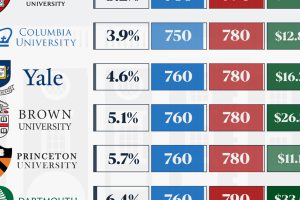According to Gallup, 85% of the world’s one billion full-time employees are unhappy at work.
While there are a number of reasons that contribute towards job dissatisfaction, a toxic work environment can have a significant impact on an employee’s performance, not to mention their physical and mental health.
But identifying red flags before accepting a job offer can be difficult; companies often sell themselves as a model workplace, when in reality, their inner workings are hugely problematic.
How to Identify a Toxic Work Environment
Today’s graphic comes to us from resume.io and it illustrates the 15 warning signs to look out for before, during, and after a job interview.

Lifting the Corporate Veil
A toxic work environment diminishes productivity by breeding a culture of discrimination, disorganization, bullying, and may even be fueled by unethical or selfish motivations.
Luckily, prospective employees can avoid 40 hours of torment a week by probing the company’s culture before signing on the dotted line. Here is a list of things to look out for:
Before the Interview
For better or worse, first impressions matter. Although excitement levels may be high, it’s important to pay attention to potential missteps, even before the interview starts.
- Vague job description: There should be clarity around the roles and responsibilities associated with the job, even if it is a new role in the company.
- Negative reviews on Glassdoor: Company review platforms are quickly becoming an indispensable tool for jobseekers who are interested in learning more about previous and current employees’ experiences.
- It took a long time to arrange an interview: Companies should show respect for the interviewee by getting back to them in a timely manner.
- Forgetting interviews: This could suggest that either the company has serious communication issues, or they do not prioritize interviewing potential employees.
- The interview starts late: Punctuality is not only expected from the person being interviewed, the interviewer should also be on time.
During the Interview
Adrenaline may be pumping when the interviewee is in the hot seat, but it’s crucial that they take stock of how the interviewers are conducting themselves.
- Unprepared interviewers: If the interview lacks structure, this could signal a disorganized team and a lack of clear expectations for the role.
- No interest in listening: Both parties need to put their best foot forward in an interview, to make sure that the interviewee’s personality and skill set aligns with the company, and vice versa.
- Authoritarian interviewer: This may indicate a lack of respect for employees.
- Inability to communicate company values: If company values are embodied by employees, then they should be top of mind and easily communicated.
- Questions are skimmed over: Companies should be transparent and be willing to provide comprehensive answers to any questions an interviewee may have.
After the Interview
In addition to assessing their own performance, interviewees should give careful consideration to how the entire interview experience went.
- Short interview: Either the company has already chosen another candidate, or they are desperate to fill the role as quickly as possible.
- Quiet workspace: A lack of teamwork or fearful employees could be the culprit for a silent office.
- No office tour: Companies should always give prospective employees a glimpse into what their day-to-day could look like by showing them around and introducing them to the team.
- Job offer was given on the day of the interview: The company could be trying to restrict the interviewee doing further research into the company, or simply filling the role as quickly as possible.
- Delayed decision-making: Failing to get back to someone who has done an interview shows a lack of respect for their time or disorganization on the company’s end.
It’s also worth mentioning that mistakes can be made by anyone, so it is perhaps not helpful to scrutinize companies for small errors in judgement when most of the experience has been positive.
Regardless, if there are any looming uncertainties, it is up to the person being interviewed to ask.
Finding the Courage to Ask Questions
When it comes to interviews, questioning the culture of the company is just as important as questioning the interviewee on their knowledge and skills.
“He who asks a question may be a fool for five minutes. He who does not ask questions, remains a fool forever.”
—Ancient Chinese proverb
Switching jobs is rarely an easy process, especially when jobseekers have come up against unforeseen challenges as a result of COVID-19.
But it is more important than ever for people to do their due diligence, and be brave enough to ask tough questions. Otherwise, they may have to repeat the cycle all over again—much sooner than they would have thought.





